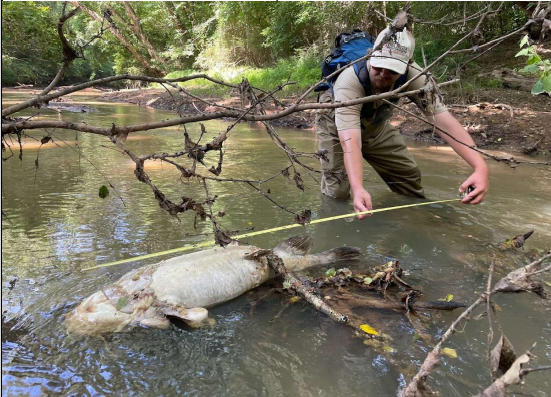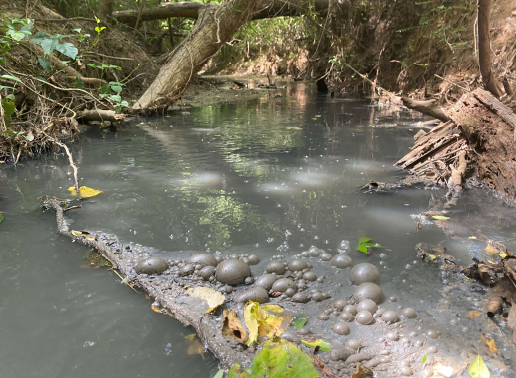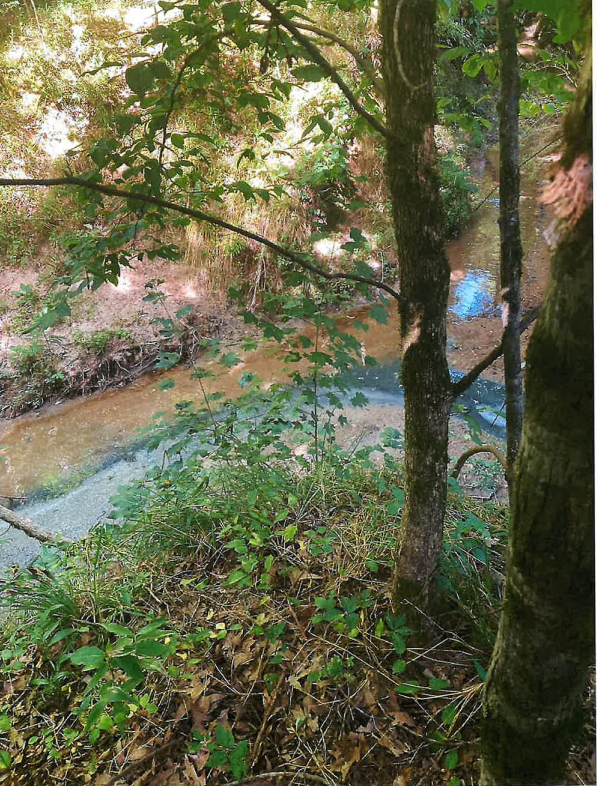Nearly 1,700 fish die after farm soil additive leaches into Little River: EPD

Editors note: this story has been updated to reflect that McAvoy Farm raises cows but is not an active dairy farm.
Nearly 1,700 fish in Little River recently died from what the Georgia Environmental Protection Division believes was pollution from soil additives that entered the waterway from a Wilkes County farm north of Thurmond Lake.
McAvoy Farm in Washington, Georgia leached soil amendment into Little River multiple days last month, noted an EPD report. When added to the ground, soil amendment can improve water retention, aeration and more. But in waterways, too much of it can cause a host of problems like algae growth, cloudy water, the death of smaller organisms fish feed on, and clogging fish gills.
Soil amendment that reached Little River, a tributary of the Savannah River, came from a breach in a farm pond and runoff from a spray field, noted the EPD. The agency said it has not concluded its investigation and is working with the landowners to remedy the issue.
In case you missed it: Concrete company wants to move Fort Gordon mixing plant off base
Campbell Vaughn: In this excessive heat, drought-tolerant plants will wilt, healthy plants may die
“I’m glad that EPD is choosing to enforce in this situation and is finding them responsible,” said Savannah Riverkeeper Tonya Bonitatibus.
Exacerbated by hot temperatures in the area, EPD said the water quality in Little River deteriorated due to the soil amendment.
The fish were found dead in a 2.25-mile span of the river, and investigators followed the visible pollution upstream to McAvoy Farm. EPD agents visited the farm on June 18 and confirmed where soil amendment had leached from the property.

McAvoy Farm said it is waiting for water testing results from the EPD investigation before commenting to The Augusta Chronicle. The farm raises cows on its property but is not an active dairy farm.
The EPD last month directed McAvoy Farm to stop using soil amendment, and to remove liquids and sludge from the tributaries on its property. The agency said that “additional enforcement is forthcoming.” McAvoy Farm said it has complied with these requests.
Sara Lips, director of Communications and Community Engagement for the EPD, said the agency has not levied any fines against McAvoy Farm.
The EPD report noted that there was a significant amount of oxygen-depleted organic sludge, which flowed into Little River in the days leading up to the fish kill. The oxygen-depleted sludge decreased the levels of dissolved oxygen – what fish need to breathe.
More than half of the fish the EPD found dead were redbreast sunfish. The EPD also found a smattering of other fish species such as bluegill and bullhead catfish.

The U.S. Army Corps of Engineers, which manages Thurmond Lake, also known locally to Augustans as Clarks Hill Lake, confirmed it was aware of the fish kill and hasn’t had any issues at the lake.
The investigation began when on June 16 and 17, the EPD received two reports of dead fish floating in Little River, seen from the bridge on Highway 47, and that a dark gray film was covering the water. One of those reports came from Sam Moore, chairman of Wilkes County’s board of commissioners.
Moore said he and other local government officials from Oglethorpe and Elbert counties suspected the cause of the fish kill while recently walking the banks of the river upstream, looking for the fish kill’s source along with EPD investigators. He said that pollution like this from soil amendment is a problem many counties in Georgia are struggling to wrangle with since the monitoring and regulation is up to state agencies.
Marisa Mecke is an environmental journalist. She can be reached at mmecke@gannett.com or by phone at (912) 328-4411.
This article originally appeared on Augusta Chronicle: Fish kill north of Thurmond Lake traced back to Washington farm

